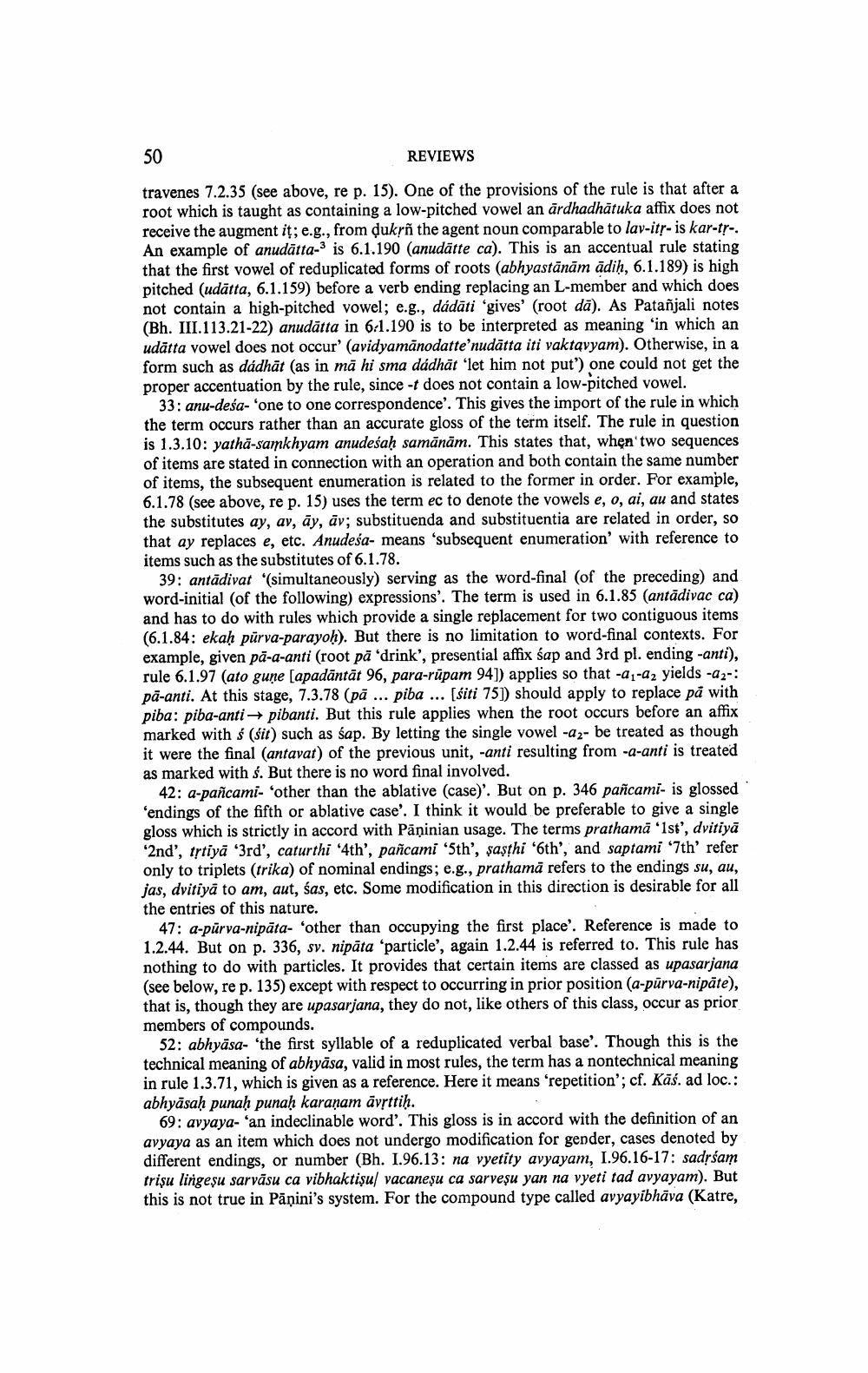Book Title: Reviews Of Different Books Author(s): Publisher: View full book textPage 8
________________ 50 REVIEWS nudatta in 6:1.190 lotte nudatta iti vaktare could not get t travenes 7.2.35 (see above, re p. 15). One of the provisions of the rule is that after a root which is taught as containing a low-pitched vowel an ardhadhatuka affix does not receive the augment it; e.g., from dukln the agent noun comparable to lav-its-is kar-tr-. An example of anudatta-3 is 6.1.190 (anudatte ca). This is an accentual rule stating that the first vowel of reduplicated forms of roots (abhyastanam adih, 6.1.189) is high pitched (udatta, 6.1.159) before a verb ending replacing an L-member and which does not contain a high-pitched vowel; e.g., dadati 'gives' (root da). As Patanjali notes (Bh. III.113.21-22) anudatta in 6:1.190 is to be interpreted as meaning 'in which an udatta vowel does not occur' (avidyamanodatte'nudatta iti vaktavyam). Otherwise, in a form such as dadhat (as in ma hi sma dadhat 'let him not put') one could not get the proper accentuation by the rule, since -t does not contain a low-pitched vowel. 33: anu-desa-"one to one correspondence'. This gives the import of the rule in which the term occurs rather than an accurate gloss of the term itself. The rule in question is 1.3.10: yatha-samkhyam anudesah samanam. This states that, when two sequences of items are stated in connection with an operation and both contain the same number of items, the subsequent enumeration is related to the former in order. For example, 6.1.78 (see above, re p. 15) uses the term ec to denote the vowels e, o, ai, au and states the substitutes ay, ay, ay, av; substituenda and substituentia are related in order, so that ay replaces e, etc. Anudesa- means 'subsequent enumeration with reference to items such as the substitutes of 6.1.78. 39: antadivat (simultaneously) serving as the word-final (of the preceding) and word-initial (of the following) expressions'. The term is used in 6.1.85 (antadivac ca) and has to do with rules which provide a single replacement for two contiguous items (6.1.84: ekah purva-parayoh). But there is no limitation to word-final contexts. For example, given pa-a-anti (root pa 'drink', presential affix sap and 3rd pl. ending -anti), rule 6.1.97 (ato gune [apadantat 96, para-rupam 94]) applies so that -21-a2 yields -az-: pa-anti. At this stage, 7.3.78 (pa ... piba ... [siti 75]) should apply to replace pa with piba: piba-anti + pibanti. But this rule applies when the root occurs before an affix marked with s (sit) such as sap. By letting the single vowel -az- be treated as though it were the final (antavat) of the previous unit, -anti resulting from -a-anti is treated as marked with s. But there is no word final involved. 42: a-pancami- 'other than the ablative (case)'. But on p. 346 pancami- is glossed 'endings of the fifth or ablative case'. I think it would be preferable to give a single gloss which is strictly in accord with Paninian usage. The terms prathama 'Ist', dvitiya '2nd', trtiya "3rd', caturthi '4th', pancami '5th', sasthi '6th', and saptami '7th' refer only to triplets (trika) of nominal endings; e.g., prathama refers to the endings su, au, jas, dvitiya to am, aut, sas, etc. Some modification in this direction is desirable for all the entries of this nature. 47: a-purva-nipata- 'other than occupying the first place'. Reference is made to 1.2.44. But on p. 336, sv. nipata 'particle', again 1.2.44 is referred to. This rule has nothing to do with particles. It provides that certain items are classed as upasarjana (see below, re p. 135) except with respect to occurring in prior position (a-purva-nipate), that is, though they are upasarjana, they do not, like others of this class, occur as prior members of compounds. 52: abhyasa- 'the first syllable of a reduplicated verbal base'. Though this is the technical meaning of abhyasa, valid in most rules, the term has a nontechnical meaning in rule 1.3.71, which is given as a reference. Here it means "repetition'; cf. Kas. ad loc.: abhyasah punah punah karanam avrttih. 69: avyaya- 'an indeclinable word'. This gloss is in accord with the definition of an avyaya as an item which does not undergo modification for gender, cases denoted by different endings, or number (Bh. 1.96.13: na vyetity avyayam, 1.96.16-17: sadrsam trisu lirgesu sarvasu ca vibhaktisul vacanesu ca sarvesu yan na vyeti tad avyayam). But this is not true in Panini's system. For the compound type called avyayibhava (Katre,Page Navigation
1 ... 6 7 8 9 10 11 12 13 14 15 16 17 18 19 20 21 22 23 24 25 26 27 28 29 30 31 32 33 34 35 36 37 38
